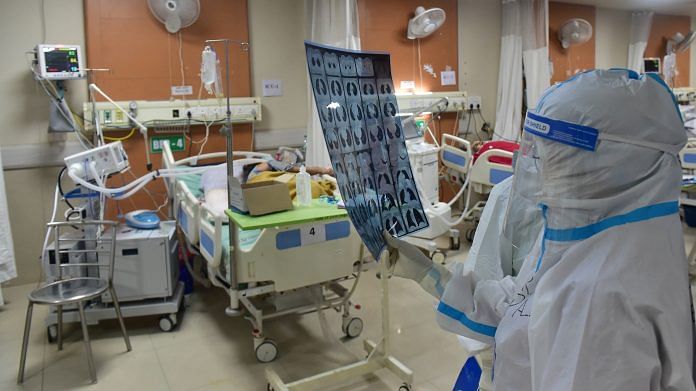New Delhi: The Narendra Modi government has started the process to increase the retirement age of doctors under the central government’s employ to 65 years for both administrative and clinical positions, ThePrint has learnt.
Inter-ministerial consultations have been completed on the matter and the health ministry is currently scrutinising the responses received from the other ministries.
The retirement age of central government doctors was increased to 65 years from 60 years in 2017. However, the doctors who hold administrative posts — such as head of a department at the Directorate General of Health Services (DGHS) — have to step down at 62 and continue solely in a clinical capacity.
The retirement age was increased to augment clinical expertise, which is why the extension did not apply to administrative posts.
However, there has been a lot of friction since the order was implemented and demands have been made to increase retirement age to 65 for doctors in both clinical and administrative positions.
“Under the current rules, any doctor who is, say the head of an institute or holds any other administrative post has to step down at 62 years and just become an ordinary, albeit senior faculty in the institute. If they are unwilling to do clinical work, they need to retire at 62. However over the years there have been demands that this rule be changed and the retirement age be made 65 years irrespective of the functions performed by the doctor,” said a senior health ministry official.
“We had moved a cabinet note for inter-ministerial consultation and have now received responses from various ministries,” the official told ThePrint.
States like Haryana have already made this change for doctors who are employed by the state government.
Also read: Traumatised, burnt out & depressed — the silent crisis of Indian doctors in the second wave
Earlier order led to ego clashes, hierarchy problems
According to a senior government functionary, the present rules have been opposed for a long time because the sudden stepping down of the head of a department or an institute, and then he or she continuing as ordinary faculty, had been leading to ego clashes and “hierarchical” problems.
“This has been a long-standing demand. It was felt that the forced stepping down at 62 led to considerable demoralisation of senior faculty members even though the logic behind it was sound. Older doctors were needed not to hog promotions but for their clinical acumen,” said the doctor.
The functionary added: “There were often problems even in their continuing in clinical capacity because the established hierarchy would be upset. Most doctors feel that this is an anomaly that needs immediate rectification.”
Meanwhile, the proposed increase in retirement age is also facing some resistance. Many government hospital doctors feel the move will close promotion avenues for younger faculty members when in a crisis like Covid, for example, it is the younger medics who shoulder the maximum burden.
“The need of the hour is to reduce the retirement age for administrative roles not to increase it. This is being done because it will help people currently holding these posts. The retirement age was increased so that they could teach not so that they could have an official car and push files,” said a senior doctor in a central government hospital in Delhi, who wished to remain unnamed.
(Edited by Rachel John)
Also read: Not just Covid, India’s junior doctors are also struggling with pay cuts & delayed salaries



